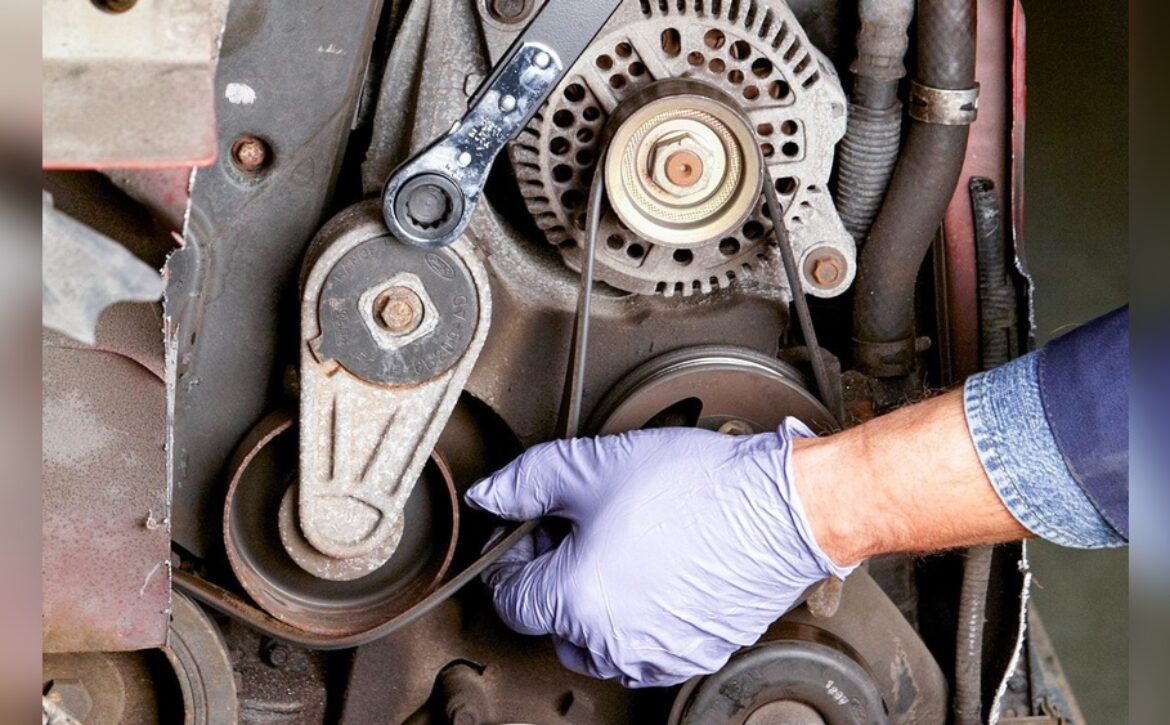
How to Become a Car Mechanic Training: Step-by-Step Guide
Are you fascinated by the roar of an engine or the intricate dance of gears and pistons? Imagine transforming that passion into a rewarding career as a car mechanic.
Whether you’re looking to switch careers or just starting out, learning how to become a car mechanic could be your pathway to a fulfilling and stable job. You’ll discover the essential steps to kickstart your mechanic training, from selecting the right courses to gaining hands-on experience.
Uncover the secrets that industry professionals wish they knew when they started, and learn how you can fast-track your way to success. Get ready to dive into the nuts and bolts of your future career, and find out what it takes to stand out in this ever-evolving field. Keep reading to unlock the roadmap to your mechanical mastery.

Choose The Right Training Program
Choosing the right training program is crucial for aspiring car mechanics. It sets the foundation for a successful career in the automotive industry. With various options available, understanding the differences can help you make informed decisions. Each path offers unique advantages tailored to different needs and learning styles.
Technical Schools Vs Community Colleges
Technical schools offer focused, hands-on training in automotive repair. They provide specialized courses designed to equip students with practical skills. Graduates often find employment quickly due to the targeted curriculum. These programs are shorter, allowing you to enter the workforce sooner.
Community colleges, on the other hand, offer a broader education. They combine general education courses with automotive training. This approach provides a well-rounded skillset, beneficial for career advancement. Community colleges may also offer associate degrees, enhancing your qualifications.
Online Courses And Certifications
Online courses offer flexibility for those with busy schedules. They allow you to learn at your own pace from home. Many platforms offer certifications recognized by the automotive industry. These can boost your resume and demonstrate your commitment to learning.
Certifications validate your skills and knowledge in specific areas. They can give you a competitive edge in job markets. Online options often include video tutorials and interactive exercises, enhancing your learning experience. This mode of learning suits those who prefer digital environments.

Gain Practical Experience
Becoming a car mechanic is not just about understanding the theory; it’s about getting your hands dirty and gaining practical experience. Whether you’re just starting or seeking to refine your skills, hands-on practice is essential. You can only learn so much from textbooks before you need to step into a garage and start turning wrenches.
Internships And Apprenticeships
Internships and apprenticeships offer invaluable opportunities to learn directly from seasoned professionals. These positions allow you to work in real-world settings, where you’ll face the everyday challenges of a mechanic’s life. Imagine diagnosing engine issues or learning how to manage customer expectations—these experiences are priceless.
Consider reaching out to local auto repair shops or dealerships for opportunities. Many are keen to take on eager learners who are passionate about the trade. As you gain experience, you’ll build confidence and develop a better understanding of what it’s like to work in the automotive industry.
Hands-on Workshops
Hands-on workshops are another excellent way to build your skills. These workshops are designed to provide practical experience in a structured environment. You’ll work with tools and equipment that are commonly used in garages, which helps bridge the gap between learning and doing.
Look for workshops that focus on specific areas you’re interested in, whether it’s engine repair, brake systems, or electrical diagnostics. Participating in these workshops not only boosts your skills but also enhances your resume. Have you thought about how attending a workshop could make you stand out to potential employers?
Remember, the more you practice, the more proficient you become. Dive into every opportunity to gain practical experience, and soon enough, you’ll find yourself mastering the art of car mechanics.
Understand Essential Tools And Equipment
Becoming a skilled car mechanic is not just about understanding the engine’s roar or the thrill of fixing a problem. It’s also about mastering the tools and equipment that bring cars back to life. Knowing your tools inside out is crucial. This knowledge can make the difference between a smooth repair and a frustrating day in the garage. Let’s dive into the essential tools every mechanic needs to excel in their craft.
Basic Hand Tools
Every mechanic’s journey begins with basic hand tools. These are the bread and butter of car repairs. Think screwdrivers, wrenches, and pliers. They’re simple yet powerful, allowing you to tackle a wide range of repairs.
Picture yourself facing a stubborn bolt; a reliable wrench can be your best ally. A complete set of sockets is indispensable. It covers everything from tiny screws to hefty bolts.
Having a well-organized toolbox can save you time and frustration. Imagine reaching for a screwdriver and finding it instantly. That’s the beauty of a well-planned setup.
Advanced Diagnostic Equipment
In today’s automotive world, cars are more than just mechanical marvels. They’re packed with complex electronics. This is where advanced diagnostic equipment comes into play.
Consider investing in an OBD-II scanner. This tool reads trouble codes from a car’s computer, pinpointing issues with precision. It’s like having a conversation with the car, understanding its needs.
High-tech diagnostic tools can seem intimidating. But once you get the hang of them, they’re indispensable. They allow you to diagnose problems swiftly, saving you and your customers valuable time.
Could you imagine the confidence of knowing exactly what’s wrong with a car before you even pop the hood? Advanced diagnostic tools give you that edge.
As you embark on your journey to become a car mechanic, ask yourself: Are you ready to embrace the tools that will transform your skills from novice to expert? Understanding and mastering these essential tools and equipment will be your stepping stone to success in the automotive world.
Develop Key Skills
Developing key skills is crucial to becoming a successful car mechanic. These skills not only help you perform your tasks efficiently but also ensure you stand out in a competitive market. Whether it’s problem-solving or effective communication, honing these abilities will set you on the path to a rewarding career.
Problem-solving Techniques
Imagine you’re faced with a car that just won’t start. You need to diagnose the issue quickly and accurately. This is where your problem-solving skills come into play. Break down the issue into smaller parts. Check the battery, ignition, and fuel systems systematically.
Think of it like a puzzle. Finding solutions requires patience and logical thinking. You might have experienced a similar problem before; use that knowledge to guide your investigation. If you’re stumped, consider asking colleagues for advice or check online forums. Remember, every problem has a solution—you just need to find it.
Communication Skills
Being a car mechanic isn’t just about fixing cars. You also need to communicate clearly with your clients. Explain the issues and solutions in simple terms. Your clients may not understand technical jargon; make it relatable to them.
Consider how you would feel if someone explained a complex problem in a way you could easily grasp. This builds trust and helps avoid misunderstandings. Good communication also extends to your team. Sharing insights and updates ensures everyone is on the same page, fostering a collaborative work environment.
What happens when you encounter a complex issue? You might need to explain it to your client, ensuring they understand the time and cost involved. Strong communication can lead to satisfied customers and repeat business.
In your journey to becoming a car mechanic, these skills will be your foundation. How will you refine these abilities to make a difference in your career?
Get Certified
Becoming a certified car mechanic is vital for career growth. Certification shows your expertise and commitment. It opens doors to better job opportunities and higher pay. Two key certifications are ASE Certification and State Licensing. Each has its own requirements and benefits. Let’s explore both to help you on your journey.
Ase Certification
ASE stands for Automotive Service Excellence. This certification is highly respected in the auto industry. It proves you have the skills to perform specific repairs. To get certified, you must pass an exam. The exam covers various automotive topics. Study guides and practice tests are available to help you prepare.
You must also have hands-on work experience. This ensures you know how to apply your knowledge. ASE Certification is not a one-time thing. You need to recertify every five years. This keeps your skills and knowledge up-to-date.
State Licensing Requirements
Some states require car mechanics to have a license. Licensing ensures mechanics meet state standards for safety and skill. Requirements vary by state, so check your local regulations. Often, a written test is part of the process. You may also need proof of practical experience.
State licenses must often be renewed periodically. This may involve continuing education or additional exams. Staying informed about your state’s requirements is crucial. It ensures you remain compliant and competitive in your field.
Stay Updated With Industry Trends
Staying updated with industry trends is crucial for aspiring car mechanics. The automotive world evolves rapidly, introducing new technologies and practices. Keeping pace with these changes enhances your skills and career prospects. Let’s explore the key ways to stay current in this dynamic field.
Emerging Automotive Technologies
New technologies are reshaping the automotive industry. Electric and hybrid vehicles are becoming more common on the roads. Understanding their mechanics is vital for modern car mechanics. Autonomous vehicles are another significant development. These self-driving cars require unique technical knowledge.
Stay informed about advancements in automotive software. Many vehicles now integrate complex computer systems. Familiarize yourself with diagnostic tools and software updates. Keep an eye on innovations like 3D printing. It’s increasingly used for manufacturing car parts.
Continuous Education Opportunities
Continuous education is essential for career growth. Many schools offer specialized courses for car mechanics. These programs cover new technologies and repair methods. Online platforms provide flexible learning options. They allow you to study at your own pace.
Participate in workshops and seminars. These events offer hands-on training. Networking with industry experts can provide valuable insights. Certifications can enhance your credibility. They demonstrate your commitment to learning and staying updated.
Build A Career Network
Starting a career as a car mechanic involves hands-on training and learning essential skills. Courses cover engine repair, diagnostics, and vehicle maintenance. Building a network with experienced professionals can enhance learning opportunities.
Building a career network is essential for aspiring car mechanics. It opens doors to job opportunities and industry insights. Connecting with others in the automotive field helps you learn and grow. Networking is about making meaningful connections. These connections can lead to mentorship and guidance. Let’s explore ways to build a strong career network.
Join Professional Associations
Professional associations offer great networking opportunities. They connect you with experienced mechanics and industry leaders. Joining these groups gives you access to resources and training. It helps you stay updated on industry trends. Many associations also host events and workshops. These are perfect for learning and meeting new people.
Attend Industry Conferences
Industry conferences are valuable networking platforms. They bring together professionals from all over. Attending these events lets you learn from experts. You gain insights into new technologies and tools. Conferences also offer workshops and discussions. These sessions enhance your skills and knowledge. Meeting people at these events can open career doors.

Explore Career Opportunities
Discover how to become a car mechanic through structured training programs. Gain practical skills and knowledge from experienced instructors. These courses prepare you for a rewarding career in automotive repair and maintenance.
Becoming a car mechanic opens doors to diverse career paths. Understanding the opportunities available helps you make informed choices. Let’s delve into the potential career paths for aspiring mechanics.
Dealerships And Independent Shops
Working at a dealership offers structured environments. Dealerships often provide brand-specific training and resources. This setting suits those interested in working with specific car brands. Independent shops, in contrast, provide varied experiences. They handle different makes and models. This environment encourages learning on the job. It’s ideal for those who enjoy variety in their work.
Specialization Options
Specializing can lead to higher expertise and pay. Common specializations include brakes, transmissions, or engine repair. Each area requires specific skills and knowledge. Consider specializing in a field you’re passionate about. Diesel mechanics focus on larger vehicles like trucks. This niche often offers competitive salaries. Another option is hybrid and electric vehicle repair. This field is growing with the rise of eco-friendly cars. Specializing in such areas can make you more marketable.
Frequently Asked Questions
What Qualifications Do Car Mechanics Need?
Car mechanics typically need a high school diploma or GED. Many pursue vocational training or apprenticeships. Certification from organizations like ASE boosts job prospects. Continuous learning is crucial as automotive technology evolves. Hands-on experience is invaluable for skill development and career advancement.
How Long Does Mechanic Training Take?
Mechanic training can take from six months to two years. The duration depends on the program type. Vocational schools offer shorter courses, while associate degrees take longer. Apprenticeships provide on-the-job learning, often extending over several years. Continuous education is vital in keeping up with industry changes.
What Skills Are Essential For Car Mechanics?
Car mechanics need strong problem-solving skills. Technical knowledge of vehicle systems is crucial. Good communication helps in explaining repairs to customers. Manual dexterity and physical stamina are important for daily tasks. Staying updated on automotive technology ensures successful career growth and customer satisfaction.
How Much Does Mechanic Training Cost?
Mechanic training costs vary widely. Vocational schools can range from $5,000 to $20,000. Community colleges may offer more affordable options. Apprenticeships often provide paid on-the-job training. Financial aid and scholarships can help offset costs. Investing in quality training leads to better job opportunities and earnings.
Conclusion
Becoming a car mechanic offers a rewarding and stable career. Start with proper training and gain hands-on experience. Practice makes perfect in this field. Stay updated with new technologies and tools. Networking with other mechanics can open new opportunities. Always strive to improve your skills.
This approach will lead to success. Remember, every expert was once a beginner. Keep learning and growing. Your passion can drive your career forward. Embrace the journey of becoming a skilled car mechanic.




